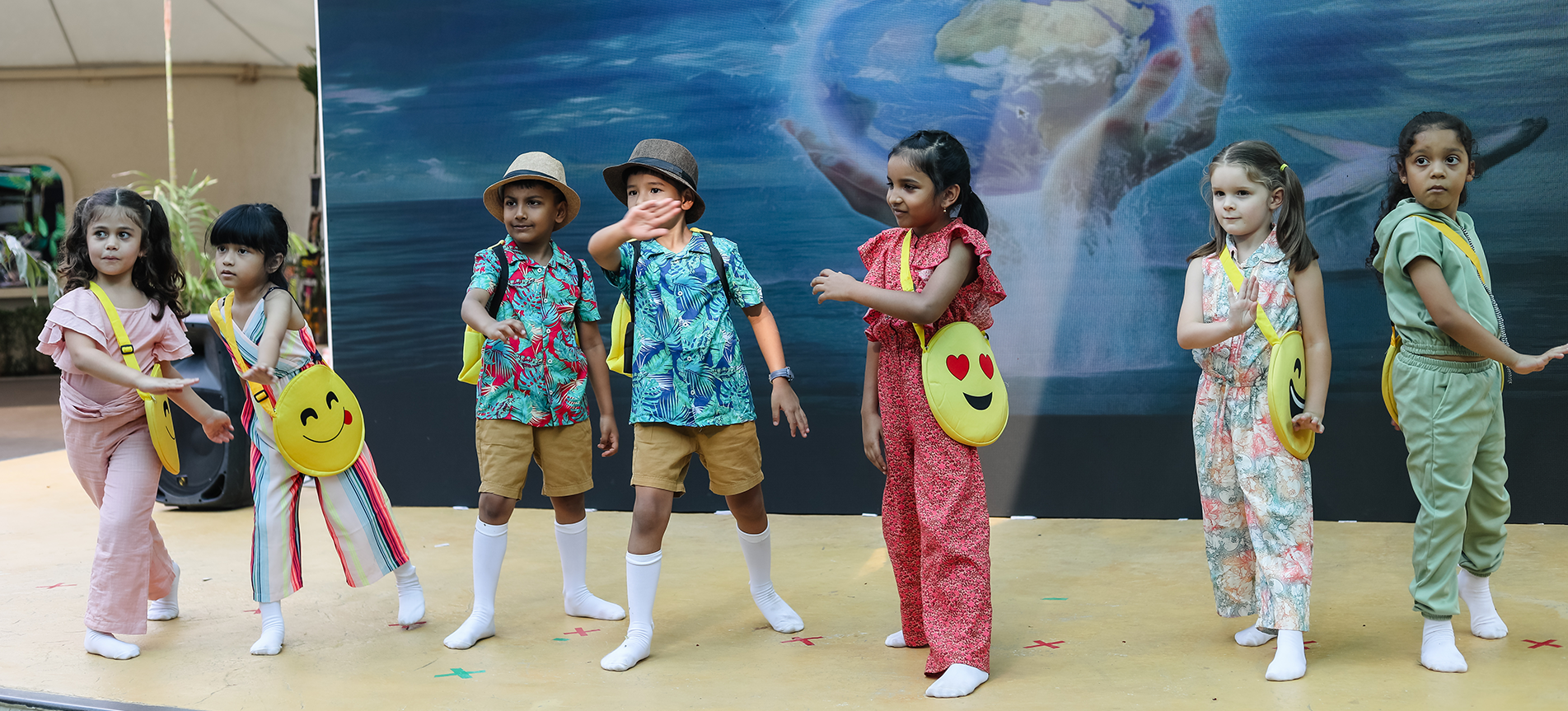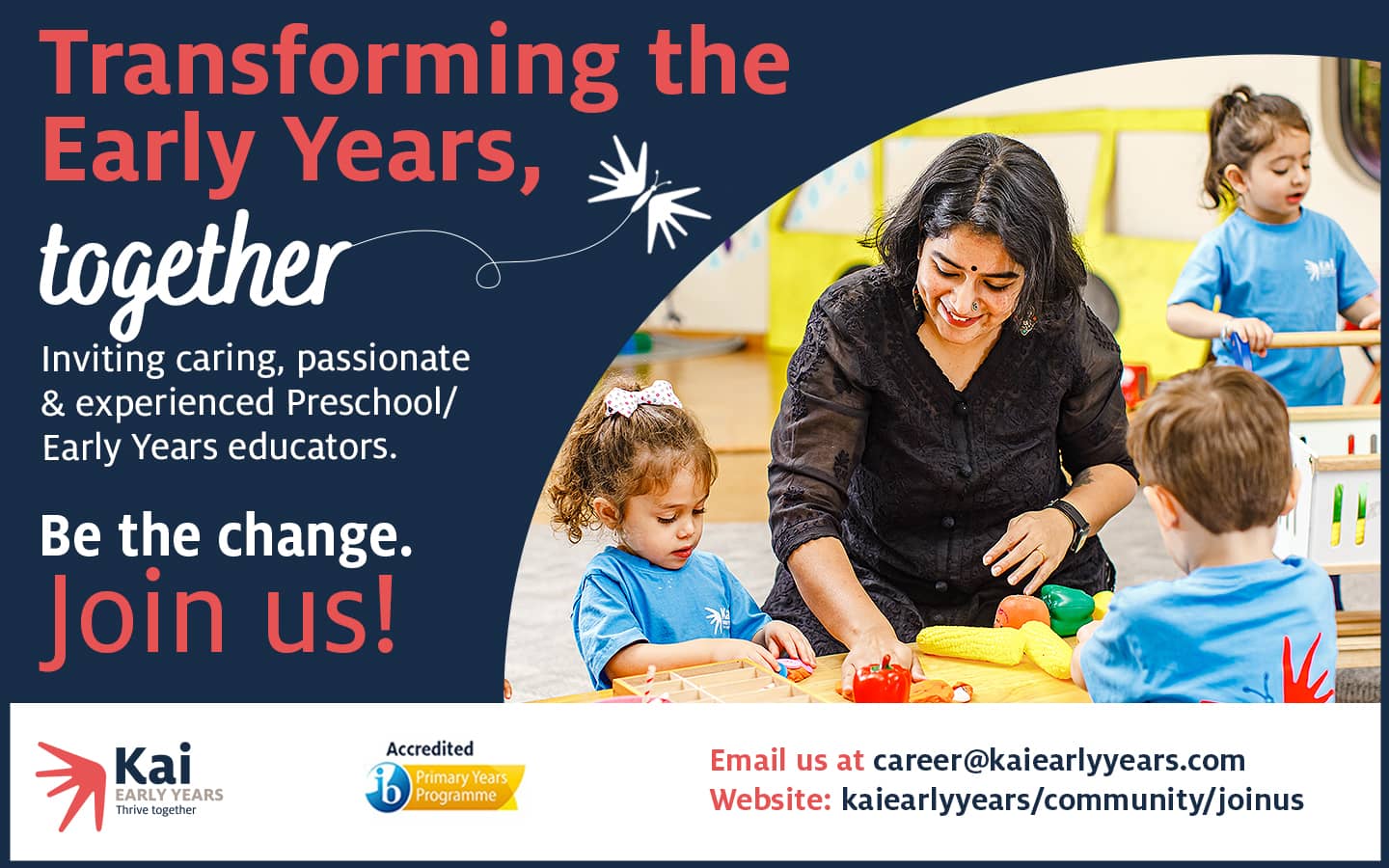K2: Ages 5 – 6 years
Timings: 8:00 am – 2:30 pm (Mondays – Fridays) || Teachers to Students Ratio: 1 : 12
Introduction
K2 at Kai marks the culmination of a child’s Early Years journey — a year where independence, confidence, and readiness for primary school come into full bloom. Children begin to demonstrate self-direction in learning, show ownership of their choices, and engage more deeply with peers and ideas. With increased focus and emotional maturity, they transition naturally into more complex academic tasks and collaborative work, all while continuing to learn through joyful, play-based exploration. This year is also a time of leadership and self-expression — as K2 children often guide younger peers, initiate group projects, and take pride in their voice, both in the classroom and the wider school community.
Learning in K2 is highly personalised, with educators attuned to each child’s strengths, pace, and interests. Whether a child needs more challenge, additional support, or space to express their individuality, they receive the attention and guidance needed to grow with confidence and purpose.
At Kai, we view this year as a launchpad — not just into Grade 1, but into a lifelong love of learning. We also work closely with families during this year — helping parents understand different Grade 1 pathways, school systems, and admission processes. With experienced educators and structured support, Kai ensures that every child not only makes a smooth transition to primary school — they thrive there. Our goal is to ensure children leave Kai feeling capable, confident, and excited for what lies ahead.
The IB – Units of Inquiry
The K2 Programme of Inquiry invites children to explore complex ideas in age-appropriate, hands-on ways. Throughout the year, children inquire into a range of engaging themes. In “Minibeasts,” they explore how small creatures contribute to the balance of ecosystems — learning about interdependence, systems, and respect for nature. In “Rights and Responsibilities,” they examine fairness, leadership, and the importance of caring for one another and our environment. Through “Understanding Money,” they investigate how financial systems work — experimenting with concepts like exchange, value, and decision-making. Finally, in “Stories Help Us Make Meaning,” children dive into the power of narrative, discovering how stories shape our thinking, identity, and relationships.
To deepen these inquiries and make learning truly meaningful, children also participate in field trips and real-world experiences connected to the themes they’re exploring. These opportunities allow them to observe, question, and interact with their environment and community — extending classroom concepts into authentic, lived learning moments.
Throughout these units, children develop key IB Learner Profile attributes such as being Inquirers, Principled, Communicators, Thinkers, and Caring individuals. They learn to ask deeper questions, collaborate with intention, and take thoughtful action. Montessori principles are fully integrated into these explorations — with children using sensorial and academic materials to explore patterns, create written texts, measure, sort, problem-solve, and reflect. These inquiries aren’t just about absorbing knowledge — they’re about developing agency, perspective, and the desire to contribute meaningfully to the world around them.
Physical Development
Children develop physical stamina, coordination, and control through structured sports, yoga, movement games, and outdoor play. Fine-motor skills are refined through daily writing, cutting, building, and independent work tasks. With increased body awareness and control, they manage their personal belongings and navigate their physical environment confidently. We celebrate their physical development and teamwork every year through our vibrant and inclusive Annual Sports Day, where children showcase their skills and enjoy friendly competition.
Numeracy
In K2, children engage with mathematics in ways that are both purposeful and intellectually stimulating. Their thinking becomes more deliberate, reflective, and precise — laying the groundwork for abstract reasoning and academic readiness. Children are introduced to essential mathematical operations such as addition, subtraction, place value, and early problem-solving, and begin applying these skills with growing confidence.
Through our dual curriculum, mathematical understanding is built using both Montessori materials and IB inquiry. Children explore quantity, measurement, patterns, sequencing, and data through real-life contexts — from counting money in a pretend shop to graphing class preferences or comparing water volume in science provocations. The tactile, hands-on approach allows them to manipulate numbers, visualise concepts, and make independent discoveries.
Rigour and joy go hand in hand — children are encouraged to think logically, reason through challenges, and reflect on strategies used. More than just learning how to “get the right answer,” they learn how to think mathematically. This approach ensures children develop not only strong number sense and operational fluency, but also the confidence, flexibility, and curiosity to approach math with enthusiasm — well-prepared for the expectations of primary school and beyond.
Language Development
By K2, children at Kai are emerging as confident, capable early readers and writers. With growing fluency, they begin to write short stories, personal reflections, messages, and fact-based texts — applying phonics knowledge, decoding skills, and structured sentence construction. They also begin to revise their work with support, developing an early understanding of how to organise, edit, and express ideas clearly and intentionally.
Through our unique dual curriculum, literacy is not taught in isolation — it is embedded meaningfully into inquiry, daily life, and the Montessori work cycle. Children read not just to decode, but to understand, to question, and to explore new perspectives. They write for real purposes: to document their thinking, share ideas with peers, label diagrams, and reflect on what they’ve learned. Oral language is equally strengthened — through group discussions, storytelling, class presentations, role-play, and reflection, children learn to listen actively and communicate confidently.
The balance between the rigour of structured literacy and the freedom of creative, inquiry-led expression ensures that children develop not only the technical foundations of reading and writing, but also a genuine love for language. This powerful combination equips them with the communication skills, academic readiness, and expressive confidence they need to thrive in primary school — and well beyond.
Social & Emotional Development
Children in K2 take greater ownership of their place in the classroom community. They take on leadership roles, collaborate on shared tasks, and engage in discussions that build empathy, perspective, and social awareness. During Montessori work time and free play, mixed-age group interactions provide rich opportunities for mentoring and learning — where older children naturally support younger peers, reinforcing their own skills while practicing patience, compassion, and responsibility.
With teacher support, children learn to express emotions clearly, navigate social dynamics, solve conflicts peacefully, and respect others’ space, ideas, and feelings. This growing awareness of self and others builds not just emotional maturity, but also the confidence and adaptability they’ll carry into primary school and beyond.
Creative Development
Children use storytelling, visual arts, music, and dramatic play to explore abstract ideas and express emotions. They engage in multi-step art and design projects that require planning, revision, and collaboration. Creativity is integrated into their thinking process — whether through designing a game, composing a song, or building a narrative from personal experience.
Approaches to Learning
By the end of K2, children are able to reflect on their learning process, manage their time, work independently, and collaborate meaningfully. They are encouraged to take initiative, revise their thinking, and show perseverance through challenges. These habits — rooted in both IB and Montessori philosophy — prepare them not just for Grade 1, but for life as active, thoughtful, and curious learners. A key milestone in this journey is the student-Led Conference, where children confidently showcase their learning, reflect on their growth, and take pride in sharing their accomplishments with their families.
“Our son happily goes to school every day, and we can see how much he is enjoying the curriculum, the IB and Montessori teaching methods, and the extracurricular activities at Kai Club in the afternoon, as well as at daycare. He has made many friends and loves interacting with the teachers and didis’ who support him in his day-to-day experiences and learning. We are very glad to have chosen Kai and highly recommend it as a school that prepares children for meaningful development and an impactful future.“
– Aritra & Gita Ghosh (K2 Parents)
Your child’s day at Kai

